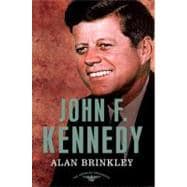
Note: Supplemental materials are not guaranteed with Rental or Used book purchases.
Purchase Benefits
What is included with this book?
Alan Brinkley is the author most recently of The Publisher: Henry Luce and His American Century, which was a Pulitzer Prize finalist. He is also the author of Voices of Protest: Huey Long, Father Coughlin, and the Great Depression, which won the National Book Award, and The End of Reform: New Deal Liberalism in Recession and War. He is the Allan Nevins Professor of History at Columbia University and has also taught at Harvard, Oxford, and Cambridge. He lives in New York City.
The New copy of this book will include any supplemental materials advertised. Please check the title of the book to determine if it should include any access cards, study guides, lab manuals, CDs, etc.
The Used, Rental and eBook copies of this book are not guaranteed to include any supplemental materials. Typically, only the book itself is included. This is true even if the title states it includes any access cards, study guides, lab manuals, CDs, etc.